Hello! | السلام علیکمMy name is Tatum, and I’m an American Christian whose native language is English. I’m learning Arabic and want to learn Farsi and Hindi. I also know a tiny bit of American Sign Language.I’d love to make new friends from any language!
Don't wanna be here? Send us removal request.
Text
We need to talk about LingoHut
I’m supposed to be studying some Italian, but instead, I was googling in my computer how to learn a new language (no, googling how to learn will not teach you shit, you have to sit down and learn your target language not how to do it, I know but I’m lazy.) and I came across LingoHut, and I have to share it.
I don’t know if someone ever talked about this page, but if they did is worth mentioning again.
So basically you go to the website and in the Home Page you have to choose what is your first language and what language are you trying to learn.
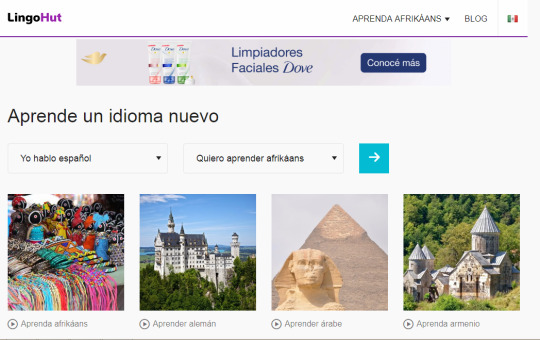
Once you choose it’ll take you to another page in which you have tons of lessons, for ex. In Italian, there are 109 lessons.
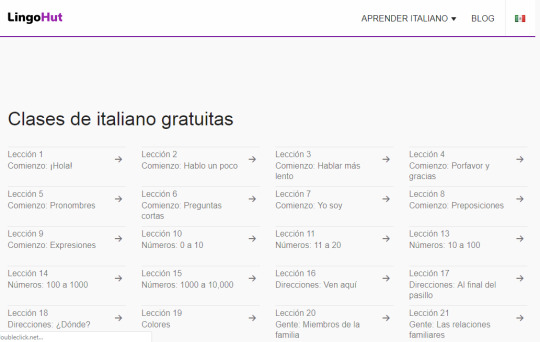
I haven’t checked every lesson yet but for example, the first one is greetings and such. You click that lesson and you have 16 flashcards that will show you the word in your target language and the translation, at the same time that someone pronounces the words.
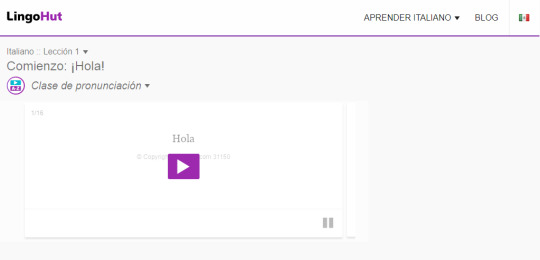
Below the flashcards, you have this ⬇️

And basically is a bunch of game, an easy matching words kind of game, some kind of tic tac toe with words, a memory game do you know the one that kids play in which they have to find the matching pictures? Same but with words and lastly a listening and matching game.
Below the bar of the games, we have the vocabulary list of the words we are taught in that lesson, and you can click the word and listen the pronunciation.
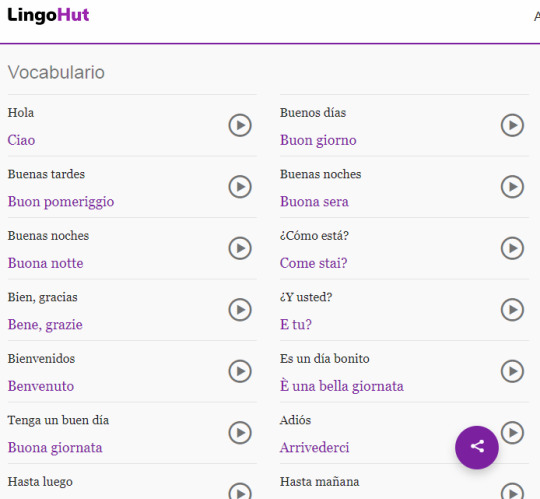
In the end, you have a bunch of the next lessons.
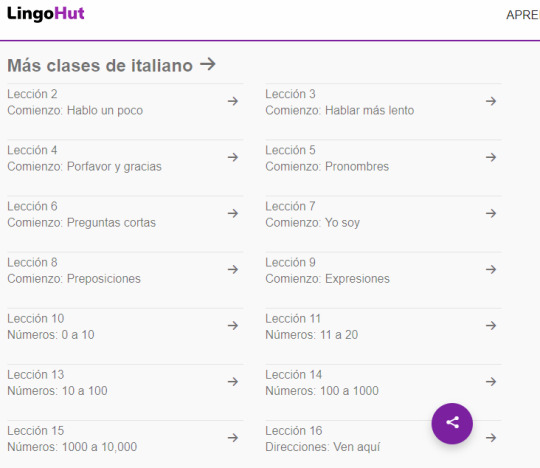
The lessons vary from the content it can be greetings, numbers, health stuff, office words, computer terminology, etc.
The website doesn’t have every language in the world, but it has a lot of them. choose your target language, in my case Italian, and enjoy, is fun and simple if you want to practice or do something related to your target language but you don’t have the willingness that day to study something more consistent like structure.
And the best part is that as far as I went looking around in this page it’s fucking free. Sure, you won’t end the one hundred and something lessons speaking like a native from whatever target language you’re learning, but it can be useful to expand your vocabulary.
11K notes
·
View notes
Text
Alternative reasons to learn languages 2.0:
1 You want to be able to know where our language came from (like greek and latin)
2 You want to read at the dark and braille can do that for you
3 Sign language -> you can: 1 talk at noisy places, 2 to talk to people at your own city who doesn’t speak your language
4 Because the grammar is so different from the others (indonesian_with_its_amazing_verbs entered the chat room)
5 Because your crush studies or speaks that language
6 You like crime fictions (so you should consider study nordic languages, there is a Glass Key Award given annually to a crime novel by an author from the Nordic countries, ponder it)
7 You love food and want to try new recipes (maybe italian, japanese, russian, thai or from some Africa’s country?)
8 You want to master some topic
9 You love so much some specific content in a foreign language that you need to understand what the creator really meant to say, so you have to learn the original language to catch the nuances of everything
10 Because you like accentuation (portuguese) -> você sabia que o sabiá é sábio?
1K notes
·
View notes
Text
arabic langblrs
as i signed up for two arabic classes this semester, i really want to see more of some arabic langblrs. so if you’re an arabic langblr or studyblr that posts arabic content (bonus points if it’s levantine arabic, as that’s the one my professor is teaching), then please reblog this post!! i’d love to follow you.
27 notes
·
View notes
Text
Reblog if you’re an active studyblr/langblr
My dash is so dead that even after five minutes, I don’t have any new posts! Please reblog if you post study tips, language learning tips or generally languages and studying related content!
247 notes
·
View notes
Text
Resources for Learning (MS) Arabic - a thread from your local native-speaker ♡
Al Jazeera has a cool "Learn Arabic" program. They've sorted it according to levels (complete beginner to intermediate), so you can just click on whatever level and there will be some lessons there for you. For an upper-intermediate level, there's a news report that you can watch (subtitles are also available, so you can read along if you like) and once you've finished watching it there's a quiz you can take to see how well you understood the material.
Madinah Arabic online and on YouTube is pretty good. I watched a couple of videos (the only thing I would say is the female voice's pronunciation is not the best #sorrynotsorry) and it seems very accurate (compared to some of the other channels I saw. yikes!)
Note: if you're watching YouTube videos to learn MSA, it's always a good idea to read the comments. Sometimes native-speakers might correct something from the video!
Arabic music is a great way to enjoy the language! The history of music in Arabic is closely related to classical Arabic poetry so there are songs in MSA. I found an AMAZING channel on YouTube (MohCoolMan) where Arabic songs are uploaded with their lyrics and an English translation. The great thing about this channel is the creator has also specified in the title what kind of Arabic each song is in, so you can go through it and listen to the ones labelled Arabic, MS Arabic, or Classical Arabic.
TV shows and movies are pretty much 99% in a dialect of Arabic. The 1% are Historical Dramas but that's usually an older version of Arabic and although it actually is not that different from Modern Standard Arabic, there will definitely be words that no one would use nowadays. Instead, I would HIGHLY recommend watching kids' TV shows. As a kid, I remember watching a lot of Arabic-dubbed Anime on a channel called Spacetoon. Nowadays, you can stream it live online or find their shows on an app called Spacetoon Go. Most of the shows are free (with ads) but I think it also depends on your region (different shows for different regions, maybe?). The ones I would recommend (from what was available in my region):
-الحديقة السرية
-دروب ريمي
-تاما والاصدقاء
-ماوكلي فتى الأدغال
-المحقق كونان*
*(this was my favorite show, it's the Arabic version of Case Closed. I couldn't find it on the app but I think in certain regions it may be available)
You can stream Spongebob in Arabic. (also Nickolodeon Arabia on YouTube)
Another TV show I watched (عدنان ولينا)
Arabian Nights (A Thousand and One Nights) in Arabic from an Egyptian broadcast (it is MSA but the narrator is Egyptian so there is a hint of an Egyptian accent, but it's nothing to worry about)
Arabian Nights, female narrator (1) (2)
More cartoons (Heidi, Babar etc.)
Finally, I honestly would just recommend getting to know other people who are learning Arabic or native-speakers who learned MSA in school (hi!)
بالتوفيق! !Good Luck
89 notes
·
View notes
Text

Pocoyo is a Spanish-British pre-school animated television series. It is about Pocoyo, a 4-year-old boy, interacting with his friends Pato (a duck), Elly (an elephant) and Loula (a dog). Viewers are encouraged to recognize situations that Pocoyo is in, and things that are going on with or around him.
Spanish
English
French
Swedish
German
Norwegian
Russian
Portuguese
Italian
Turkish
Indonesian
Danish
Finnish
Hungarian
Japanese
Korean
Chinese
2K notes
·
View notes
Text
Langblr Follow Train (April 2020)

Let’s start a langblr follow train to find new langblrs/lingblrs to follow and befriend! 🚂 1. Only langblrs (blogs about languages) and lingblrs (blogs about linguistics), please! 2. Reblog this post before 30.4.2020! 3. Follow some blogs that have reblogged this post! 4. Make new friends!
78 notes
·
View notes
Text
How to learn a language fast
1. Learn a sizable vocabulary, there is a good list of 625 words you should know in your target language. Spend time building this up and be sure to practice your pronunciation that is vital. To learn vocabulary there are many methods: flashcards, lists, apps, mindmaps etc. I personally use the app Quizlet as it has many learning tools and flashcards so you can practice on the go.
2. Learn basic grammar, for this you can use a book or there are plenty of websites online that will have resources. You just need to have master a section at a time so you have the basic learnt.
3. Listen to the spoken language, if you are in the country awesome but chances you are not so some ways to this are: listening to audio files, using apps (I know Duolingo has a aspect that reads stories), watch YouTube videos in that language, watch films and listen to the radio (there are lots of streams online).
4. Practice speaking, pronunciation is vital plus saying things over and over again can help move it to the long term memory. It will make you feel much more confident in your abilities. To practice speaking it would be ideal to find someone who is fluent in your target language but if not there are speaking exercises online, you could try read a book out loud or even learn a song.
5. Stick to it, this is probably the most important part if you don’t keep practicing regularly you will forget it all. Even if it is just something small it is better than nothing and will be worth it when you can speak a whole new language.
Good Websites
BBC Languages
Duolingo
Dictionaries
Quizlet
Memrise
Babbel
Fluent Forever
Feel free to add more helpful tips, tricks etc below.
I’m going to learn Spanish.
2K notes
·
View notes
Text
Language learning and langblr tips from me
What to learn first when learning a new language
How to stay motivated when learning languages
How to learn a language with a different script
How to learn kanji
Vocabulary list topics
How to make vocabulary lists
How to expand your vocabulary
How to learn vocabulary and verb endings
How to improve your listening skills
How to practice speaking your target language
How to go from intermediate to advanced in your target language
How to learn two (or more) languages at once
How to learn all the languages you want
How to avoid mixing up languages
How to study languages with depression
How to practice speaking when you have social anxiety
How to study with a language exchange partner and what to talk about with them
How to study with Duolingo
How to make a language notebook
How to divide your language notebook/what to write in your language notebook
How to use bullet journal in language learning
How to find native speakers to practice with
How to know what level you are in your languages
How to start a langblr
11K notes
·
View notes
Text
Language Resources Masterpost
chiara-klara-claire :

🌷 I made this for myself and will be updating it from time to time, feel free to reblog 🍀 big thanks to: @lovelybluepanda, @wonderful-language-sounds 🍀my langstagram
brilliant directory by @thelanguagecommunity
vocab masterpost by @portiastudies
mylanguages.org (grammar, vocab, phrases, quizzes)
loecsen.com (vocab, phrases, you can listen to it)
vocabulary 📖
http://langoland.free.fr/ (vocab, has minority languages!!)
polymath (vocab)
Babadada (vocab)
Babadum (vocab game)
my Pinterest Language board (vocab, idioms)
tests & listening 📝 🎧
vocabulary TEST, multiple choice tests
Goethe verlag tests
listen to a radio anywhere in the world
http://listeningpractice.org/ thanks @sweet-child-of-mine11
listening tests
librivox (audiobooks)
lyrikline.org (listen to poems!!!)
reading📚
gutenberg.org
readlang.com
manybooks.net
childrenbooksforever | childrenslibrary
The Little Prince | Alice | Harry Potter
BILINGUIS (has Alice in Wonderland)
Grimm fairytales
Germanic languages
Dutch-Frisian-Afrikaans-Limburgish masterpost
🇳🇱DUTCH #nl
PDFs
vocab masterpost by @hotairballoon221
linking words by @join-the-dutch-clan
when to use DE/HET
irregular verbs
file of knowledge
watch rundfunk (10-20mins yt comedy series)
🇧🇪 Belgian comic with voice over
FRISIAN
vocab
funwithfrisian FB
🇬🇧ADVANCED ENGLISH: 60 cool words
🇩🇪GERMAN #de
exercise at schubert-verlag
exercise at deutschakademie
movies by @themessyjournals more movies by @thegirlfromthelibrary
downloadable books to read
north Germanic
false friends SE-DK | false friends SE-NO
project Runeberg (classic nordic literature!!!)
masterpost
🇩🇰DANISH #dk
masterpost by @mit-danske-eventyr | by thelanguagecommunity
useful grammar tips (til or for etc)
PDF: colloquial Danish | Teach Yourself | essential grammar
assimil (french)
unilang
listen to poems
nordic langs discord i don’t even have discord myself but just dropping this here you never know
🇮🇸ICELANDIC #is
PDF textbooks
masterpost by @icelandicreverie-blog
children tv thanks @sprachtraeume
200 words by @islenskafyriralla
https://islenskafyriralla.tumblr.com/laera
beautiful Icelandic words
🇫🇴FAROESE #fo
downloadable resources
masterpost
vocab
PDFs
🇸🇪SWEDISH #se
PDFs
Astrid Lindgren etc. books
watch Pippi
masterpost by @langsandculture (textbooks, websites..)
lär dig svenska - useful expressions/grammar
verb list
some less common verbs
adverbs list by @svensklangblrless
anki decks (C1 lvl too!!)
writers recommendations by @svensklangblr.
freudian slip productions (comedy videos)
slang by @midvinterfrost
vocab list masterposts: 1 | 2 | 3 | 4 by @languagemoose
(movie recs wanted, i might make on myself) I also should make a vocab list including vocab lists by @polyglotswede who made a lot!!
🇳🇴NORWEGIAN #no
Textbooks post; PDF Textbooks
assimil (french)
grammatikk.com
85 irregular verbs by @language-princess
norskprøven
exercises: infonorwegian ; exploringnorwegiangrammar
masterpost by @languagecollector
masterpost by @treasuredthings
watch moomin!!
read Norwegian folktales
i/på by @an-american-in-norway
common mistakes by @letslearnnorwegian
Celtic languages #celtic
masterpost by @travellingual masterpost by @a-second-soul
🏴WELSH #welsh
masterpost
BBC grammar PDF
🇮🇪IRISH #ie
online lessons
daltaì na Gaeilge (grammar, phrases, vocab)
PDF textbooks
duolingo basics by @gaeilge101
Slavic languages
🇨🇿CZECH
assimil (in french)
🇵🇱POLISH
assimil (in french)
masterpost by @languageoclock
polish grammar in a nutshell
lernpolisch.de (in german, +audios)
🇷🇺RUSSIAN #ru
learn to read Russian in 15 mins
assimil (french)
misc
🇫🇮FINNISH #fi uralic masterpost
PDF textbooks thanks @languagessi !
online lessons
masterpost
watch moomin
🇫🇷FRENCH #fr
100 topic specific vocab lists
vocab lists by @nerdinaomi
verbs
movies by @themessyjournals
downloadable books to read
read Asterix
🇬🇷GREEK
assimil (french)
🇭🇺HUNGARIAN
PDFs
assimil
🇯🇵 JAPANESE #jp thanks @udaitenma
resources
joshu
learn-japanese-adventure –>vocab (Japanese culture related too)
tofugu grammar lessons
grammar lessons
Japanese verb conjugation by @japanesewithanime
JLPT material
survival phrases
cheatsheets
100 grammar points
🇰🇷KOREAN #kr
http://www.koreanfromzero.com/
https://www.learn-korean.net/
https://www.howtostudykorean.com/
🌷 my posts 🌻 insta: art+self | languages+snailmail 🌺 my app review 🍀 planned langs to add: estonian, Lithuatian, Latvian, Hawaiian
(started 22/3, finished 6/4/2020)
1K notes
·
View notes
Text
You guys I just found something that’s pretty cool if you’re interested in practicing listening in your target language (and learning something new altogether at the same time!)
Khan Academy has a bunch of videos in foreign languages and apparently it’s called Khan Academy International (here’s a link to their tumblr).
They have content in quite a few languages, and while some of them have mostly math and science stuff, there are a lot of channels that delve into a lot of the other content that Khan Academy English does, like art history, world history, etc.
So far I’ve found their Youtube channels in these languages (I’m sure there are more though, and if you find any feel free to add them to this post!):
Russian: https://www.youtube.com/user/KhanAcademyRussian
French: https://www.youtube.com/user/KhanAcademyFrancais/
Spanish: https://www.youtube.com/user/KhanAcademyEspanol/
Danish: https://www.youtube.com/user/KhanAcademyDansk/
Norwegian: https://www.youtube.com/user/KhanAcademyNorsk/
Turkish: https://www.youtube.com/user/KhanAcademyTurkce
Polish: https://www.youtube.com/user/KhanAcademyPolski
Italian: https://www.youtube.com/user/KhanAcademyItaliano
German: https://www.youtube.com/user/KhanAcademyDeutsch
Mandarin: https://www.youtube.com/user/KhanAcademyMandarin
Japanese: https://www.youtube.com/user/KhanAcademyJapanese
Hindi: https://www.youtube.com/user/KhanAcademyHindi
Bulgarian: https://www.youtube.com/user/KhanAcademyBulgarian
Portuguese: https://www.youtube.com/user/KhanAcademyPortugues
Korean: https://www.youtube.com/user/KhanAcademyKorean
Serbian: https://www.youtube.com/user/KhanAcademySerbian
Mongolian: https://www.youtube.com/user/KhanAcademyMongolian
Thai: https://www.youtube.com/user/KhanAcademyThai
11K notes
·
View notes
Text
How to learn a language when you don’t know where to start:
General Plan:
Weeks 1 and 2: Purpose:
Learn the fundamentals sentence construction
Learn how to spell and count
Start building a phrase stockpile with basic greetings
The Alphabet
Numbers 1 - 100
Subject Pronouns
Common Greetings
Conjugate the Two Most Important Verbs: to be and to have
Basic Definite and Indefinite Articles
Weeks 3 and 4: Purpose:
Learn essential vocabulary for the day-to-day
Start conjugating regular verbs
Days of the Week and Months of the Year
How to tell the time
How to talk about the weather
Family Vocabulary
Present Tense Conjugations Verbs
Weeks 5 and 6: Purpose:
Warm up with the last of the day-to-day vocabulary
Add more complex types of sentences to your grammar
Colours
House vocabulary
How to ask questions
Present Tense Conjugations Verbs
Forming negatives
Weeks 7 and 8: Purpose:
Learn how to navigate basic situations in a region of your target language country
Finish memorising regular conjugation rules
Food Vocabulary and Ordering at Restaurants
Money and Shopping Phrases
Present Tense Conjugations Verbs
Weeks 9 and 10: Purpose:
Start constructing descriptive and more complex sentences
Adjectives
Reflective verbs
Places vocabulary
Weeks 11 and 12: Purpose:
Add more complex descriptions to your sentences with adverbs
Wrap up vocabulary essentials
Adverbs
Parts of the body and medical vocabulary
Tips for Learning a Foreign Language:
Learning Vocabulary:
What vocabulary should I be learning?
There are hundreds of thousands of words in every language, and the large majority of them won’t be immediately relevant to you when you’re starting out.Typically, the most frequent 3000 words make up 90% of the language that a native speaker uses on any given day. Instead try to learn the most useful words in a language, and then expand outwards from there according to your needs and interests.
Choose the words you want/need to learn.
Relate them to what you already know.
Review them until they’ve reached your long-term memory.
Record them so learning is never lost.
Use them in meaningful human conversation and communication.
How should I record the vocabulary?
Learners need to see and/or hear a new word of phrase 6 to 17 times before they really know a piece of vocabulary.
Keep a careful record of new vocabulary.
Record the vocabulary in a way that is helpful to you and will ensure that you will practice the vocabulary, e.g. flashcards.
Vocabulary should be organised so that words are easier to find, e.g. alphabetically or according to topic.
Ideally when noting vocabulary you should write down not only the meaning, but the grammatical class, and example in a sentence, and where needed information about structure.
How should I practice using the vocabulary?
Look, Say, Cover, Write and Check - Use this method for learning and remembering vocabulary. This method is really good for learning spellings.
Make flashcards. Write the vocabulary on the front with the definition and examples on the back.
Draw mind maps or make visual representations of the new vocabulary groups.
Stick labels or post it notes on corresponding objects, e.g when learning kitchen vocabulary you could label items in your house.
How often should I be practising vocabulary?
A valuable technique is ‘the principle of expanding rehearsal’. This means reviewing vocabulary shortly after first learning them then at increasingly longer intervals.
Ideally, words should be reviewed:
5-10 minutes later
24 hours later
One week later
1-2 months later
6 months later
Knowing a vocabulary item well enough to use it productively means knowing:
Its written and spoken forms (spelling and pronunciation).
Its grammatical category and other grammatical information
Related words and word families, e.g. adjective, adverb, verb, noun.
Common collocations (Words that often come before or after it).
Receptive Skills: Listening and Reading
Reading is probably one of the most effective ways of building vocabulary knowledge.
Listening is also important because it occupies a big chunk of the time we spend communicating.
Tips for reading in a foreign language:
Start basic and small. Children’s books are great practice for beginners. Don’t try to dive into a novel or newspaper too early, since it can be discouraging and time consuming if you have to look up every other word.
Read things you’ve already read in your native language. The fact that you at least know the gist of the story will help you to pick up context clues, learn new vocabulary and grammatical constructions.
Read books with their accompanying audio books. Reading a book while listening to the accompanying audio will improve your “ear training”. It will also help you to learn the pronunciation of words.
Tips for listening in a foreign language:
Watch films in your target language.
Read a book while also listening along to the audio book version.
Listen to the radio in your target language.
Watch videos online in your target language.
Activities to do to show that you’ve understood what you’ve been listening to:
Try drawing a picture of what was said.
Ask yourself some questions about it and try to answer them.
Provide a summary of what was said.
Suggest what might come next in the “story.”
Translate what was said into another language.
“Talk back” to the speaker to engage in imaginary conversation.
Productive Skills: Speaking and Writing
Tips for speaking in a foreign language:
If you can, try to speak the language every day either out loud to yourself or chat to another native speaker whether it is a colleague, a friend, a tutor or a language exchange partner.
Write a list of topics and think about what you could say about each one. First you could write out your thoughts and then read them out loud. Look up the words you don’t know. You could also come up with questions at the end to ask someone else.
A really good way to improve your own speaking is to listen to how native speakers talk and imitate their accent, their rhythm of speech and tone of voice. Watch how their lips move and pay attention to the stressed sounds. You could watch interviews on YouTube or online news websites and pause every so often to copy what you have just heard. You could even sing along to songs sung in the target language.
Walk around the house and describe what you say. Say what you like or dislike about the room or the furniture or the decor. Talk about what you want to change.This gets you to practise every day vocabulary.
Tips for writing in a foreign language:
Practice writing in your target language. Keep it simple to start with. Beginner vocabulary and grammar concepts are generally very descriptive and concrete.
Practice writing by hand. Here are some things you can write out by hand:
Diary entries
Shopping lists
Reminders
What could I write about?
Write about your day, an interesting event, how you’re feeling, or what you’re thinking.
Make up a conversation between two people.
Write a letter to a friend, yourself, or a celebrity. You don’t need to send it; just writing it will be helpful.
Translate a text you’ve written in your native language into your foreign language.
Write a review or a book you’ve recently read or a film you’ve recently watched.
Write Facebook statuses, Tweets or Tumblr posts (whether you post them or not will be up to you).
Write a short story or poem.
Writing is one of the hardest things to do well as a non-native speaker of a language, because there’s no room to hide.
There are lots of ways to improve your writing ability, but they can be essentially boiled down to three key components:
Read a lot
Write a lot
Get your writing corrected
28K notes
·
View notes
Photo
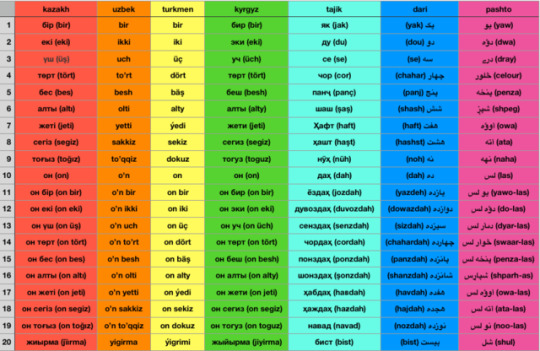
Numbers in Languages of Central Asia.
Kazakh is one of the main languages of Kazakhstan, alongside Russian, and is spoken by over 5 million people within the country. It is from the Kipchak-Nogai branch of the Kipchak family of Common Turkic, in the Turkic language family. It can be seen written in the Latin, Cyrillic and Arabic alphabets.
Uzbek is the official language of Uzbekistan, with about 27 million speakers. It comes from the Karluk branch of Common Turkic in the Turkic language family. It is typically written in the Latin or the Cyrillic alphabet.
Turkmen, the official language of Turkmenistan, is spoken by about 6.7 million people. It comes from the Eastern Oghuz branch of the Oghuz languages within Common Turkic. It can be seen written in Latin, Cyrillic and Arabic script.
Kyrgyz is the official language of Kyrgyzstan and is spoken by over four million people. Like Kazakh, it is from the Kipchak branch of Common Turkic, belongs to the Kyrgyz-Kipchak subgroup. Kyrgyz can be written in Person-Arabic script or Cyrillic script.
Tajik, the official language of Tajikistan, is spoken by about 8.4 million people and comes from a completely different linguistic family as the languages previously described. It is actually an Indo-European language, from the Persian subgroup of the Iranian languages. Tajik can be written in the Cyrillic or Latin alphabet.
Dari, also known as Farsi, is an official language of Afghanistan and is spoken by 12.5 million people. It is also a Persian language from the Indo-Iranian branch of the Indo-European languages. It uses the Persian alphabet.
Pashto is the other official language of Afghanistan, mostly spoken southeast of the Dari speaking area by 58 million people. It is also an Iranian language, but comes from the Eastern Iranian branch rather than the Western Iranian branch (from which Persian languages originated). It is written in Person-Arabic script.
Note: Spelling, pronunciation or full words may differ according to region or locale.
163 notes
·
View notes
Photo

1 Month 1 Language
1 Month Kanji Challenge
14 Day Langblr Challenge
30 Day Langblr Challenge
34 Hour Langblr Challenge
55 Days of Vocabulary Challenge
90 Day Vocab Challenge
100 Days Challenge For Langblrs
100 Hour 40 Day Language Challenge
A Question A Day Challenge
Build Your Vocab Challenge
Composition Challenge
Fiction Writing Challenge
Langblr Accent Tag
Langblr Culture Challenge
Langblr Music Challenge
Langblr Vocab List Challenge
Langblr Diary Challenge
Langblr News Challenge
Original Langblr Content Challenge
Linguistic Diversity Challenge
Indigenous Language Awareness Challenge
Vocabulary Challenge
SpeakingIn20 Langblr Challenge
A Book In Target Language Challenge
Brick-By-Brick Language Learning Challenge
Review Challenge
Subtitles Challenge
Summer Language Challenge
Translating Challenge
Challenges for certain months:
February Polyglot Challenge
March Polyglot Challenge
April Polyglot Challenge
May Polyglot Challenge
May Polyglot Challenge
August Polyglot Challenge
September Polyglot Challenge
September: 30 Day Langblr Resource Photo Challenge
October Polyglot Challenge
November Polyglot Challenge
December Polyglot Challenge
December Polyglot Challenge
10 Polyglot Things to Do This September
10 Polyglot Things to Do This October
Langblr NaNoWriMo
9K notes
·
View notes
Text
I know this is a tiny accomplishment in the grand scheme of things, but it feels really good to be able to listen to a native speaker and understand them, even if I can’t speak many words back.
2 notes
·
View notes
Text
While it's great if you can use the quarantine to learn a new language or write a book, it's also perfectly okay if all you can manage is scrolling through social media or binge watching Netflix. While it's great to make the most of this situation, for some of us just getting through it is an achievement by itself. So don't be too hard on yourself if you haven't managed to draw or write daily or if you have yet to dedicate hours to a new hobby. It's okay. You're doing good even if all you're doing is keeping yourself together.
35K notes
·
View notes
